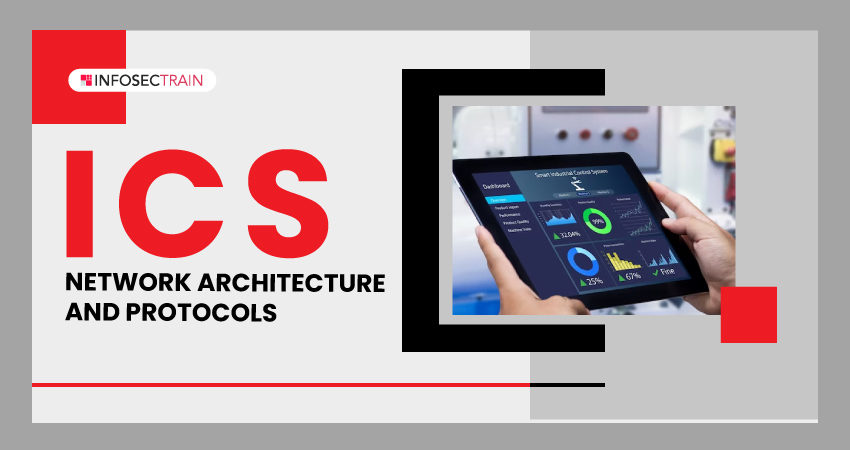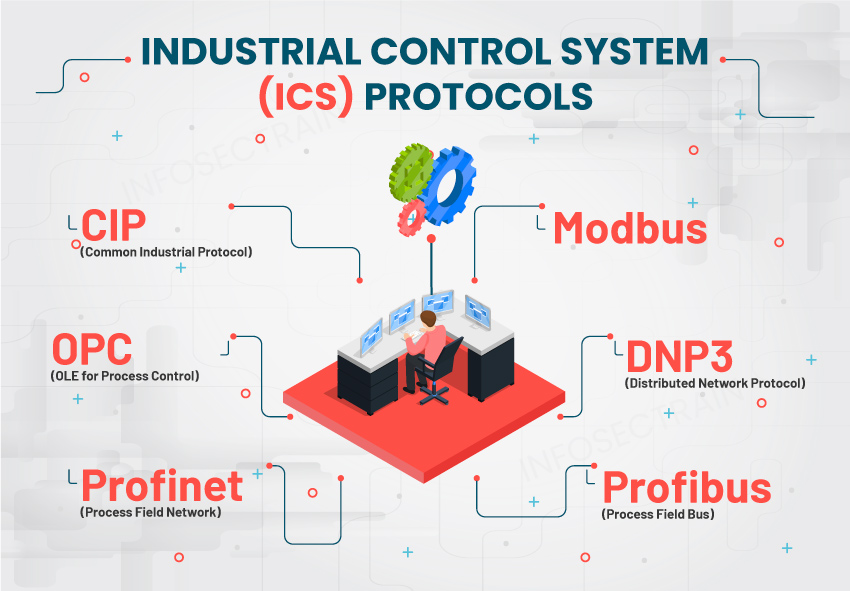ICS Network Architecture and Protocols
In the modern era, where industries are getting more automated and interconnected, it is essential to understand the intricate technical web of these critical systems. Industrial Control Systems (ICS) are the backbone of multiple essential infrastructure sectors, including healthcare, water supply/power plants, manufacturing, and transportation. ICS plays a pivotal role in regulating and monitoring key infrastructure physical processes. Understanding the ICS’s network architecture and the protocols that control their communication is vital for their efficiency, reliability, and security.

ICS Network Architecture
Industrial Control System (ICS) Network Architecture is a well-organized framework utilized to design, construct, and oversee the network infrastructure crucial for supporting vital industrial operations and systems. It is designed to facilitate the seamless interconnection of field devices, control systems, and SCADA systems, enabling the real-time exchange and management of data. The objective is to ensure that everything functions smoothly with:
- High reliability
- Low latency real-time performance
- Scalability to meet changing industrial requirements
- Rigorous cybersecurity to protect against threats
Basically, ICS Network Architecture is the foundation that helps operators and engineers keep an eye on, control, and improve industrial processes, which helps make critical infrastructure sectors safer, more productive, and more sustainable.
ICS Protocols
Some important Industrial Control System (ICS) protocols include:

- CIP (Common Industrial Protocol): CIP, developed and overseen by the Open DeviceNet Vendor Association (ODVA), is a communication protocol extensively utilized for automating industrial operations and enabling smooth interaction among diverse devices and systems. It streamlines the creation and integration of intricate control systems within industrial environments.
- Modbus: Modbus is one of the most commonly used industrial communication protocols within the application layer. It allows client-server mode communication across different types of equipment, even when they are linked through diverse underlying technologies.
- DNP3 (Distributed Network Protocol): DNP3, a three-tiered protocol, is designed for real-time communication between Supervisory Control and Data Acquisition (SCADA) systems and field devices. It is widely used in the utility industry, especially in the water and electric systems. It offers data retrieval, error detection, remote control, and event reporting features.
- Profibus (Process Field Bus): Profibus is a Fieldbus protocol mainly used in manufacturing environments for device-to-device data communication. It currently has two subtypes: Profibus DP (for decentralized peripherals) and Profibus PA (for process automation).
- Profinet (Process Field Network): Profinet is a popular Ethernet-based protocol widely used in industrial automation for real-time control and high-speed communication. It offers reliable communication and control in industrial automation systems.
- OPC (OLE for Process Control): OPC is a set of standards for connecting industrial automation and control systems, particularly in Windows-based environments. It uses Object Linking and Embedding (OLE) technology for seamless communication between various devices and systems.
Related blogs:
- What is Operational Technology (OT)?
- Key Components of OT: Empowering Industrial Control & Monitoring
- Roles and Responsibilities of OT Security Professionals
- How to Make a Career Transition to OT Security
- Fundamentals of OT/ICS Security Foundation
- OT/ICS Security Interview Questions
- How to Secure an OT Network?
- Top Challenges Faced in OT Security in 2024
OT/ICS Security Foundation Training with InfosecTrain
Learn all you need to know about the ICS Network Architecture and Protocols by taking InfosecTrain‘s OT/ICS Security Foundation training course. This comprehensive program provides a detailed introduction to OT/ICS Security, making it suitable for IT and OT Professionals. Our knowledgeable and experienced instructors, well-versed in OT Security, will guide you through a wide range of topics, including architecture, threat landscape and vulnerabilities, risk management, and security best practices and industry standards. The course offers a flexible learning approach with instructor-led sessions and blended learning methods. Enroll today to acquire in-depth knowledge and skills for protecting Operational Technology and Industrial Control Systems.







 1800-843-7890 (India)
1800-843-7890 (India) 
